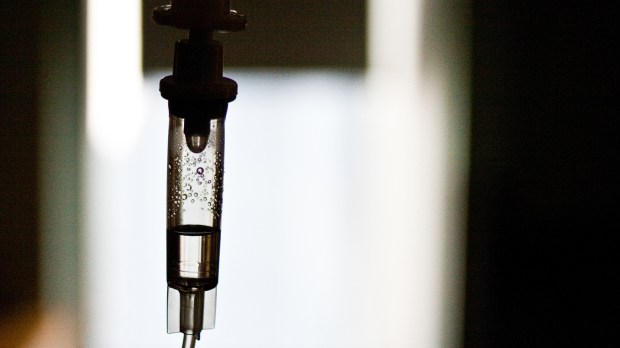A high-profile controversy about a very sick child in England is reminiscent of the Charlie Gard case of last summer, which evoked comment from even Pope Francis.
And even though the case of Alfie Evans is medically different from that of Charlie Gard, there are similar ethical principles, said a leading bioethics organization in the U.K.
“Every human life is worthy of respect, and patients’ lives should not be targeted deliberately, although not every treatment is worth pursuing,” said the Anscombe Bioethics Centre, a national Catholic bioethics center for the UK and Ireland, in a statement. “Doctors should not be forced to continue treatment if they believe it offers little or no benefit relative to the burdens it entails, nor should they be forced to refer for specific treatments that they do not believe to be in the best interests of their patient.”
Alfie Evans is the 20-month-old son of Tom Evans and Kate James, from Bootle, Merseyside, who has a degenerative neurological condition that has not been precisely diagnosed.
Doctors at Alder Hey Children’s Hospital have told the High Court that continuing treatment would be “futile.” Today, according to the note published by BBC, “Alder Hey Children’s Hospital argued that continuing to treat the 21-month-old, who has a mystery illness, was ‘unkind, unfair and inhumane'”.
His parents, Tom Evans and Kate James had hoped to prolong Alfie’s life with treatment at a hospital in Rome.
A court already heard, earlier this month, that MRI scans show further decline of the toddler’s brain.
A doctor treating Alfie said the boy was “unaware and in a deep coma,” according to the BBC.
But the boy’s father insists he is aware and showing improvement and wants him to be allowed to travel to a specialist hospital in Rome.
Michael Mylonas, the lawyer representing the hospital, said last week that, at the request of the parents, three medical experts from the Vatican-linked Bambino Gesu Pediatric Hospital in Rome had visited Alfie and had reached the same conclusions in terms of the “complete futility” of trying to find a cure or alleviating his seizures, the BBC reported:
The Italian experts had suggested operations to help Alfie breathe and feed and keep him alive for an “undefined period.” But Dr Martin Samuels, an expert in the ventilation of children, believed such operations were “inappropriate.”
Meanwhile, another set of parents are fighting a High Court judge’s ruling that doctors can stop life-support treatment to their brain-damaged 11-month-old. A hospital wanted to give only palliative care to Isaiah Haastrup as staff felt continued life-support was “not in his best interests.” As of today, Haastrup’s father has been banned from the hospital his son is in, for the second time.
The fact that two such cases were in the news in the same week drives home the point that Calum MacKellar, research director of the Scottish Council on Human Bioethics, was making in an interview on Monday.
“A lot of these kinds of problems have arisen from new technology,” said MacKellar, who declined to comment on the specifics of the present cases. “A lot of these kinds of children would already have died if new technology had not been developed. And these kinds of ethical dilemmas will multiply in the future, as more and more technology becomes available to keep people alive.”
Though it is rare for there to be serious conflict between parents wishes and the best judgment of medical professionals, MacKellar added, courts will continue to have to intervene in order to ensure that the best interests of children be respected.
“From an ethical perspective it all depends on whether these children would be dying without the external support that is being given to them. If they cannot survive without all the equipment and they are dying, it would be considered ethical to say ‘enough is enough. We can’t really do that much to save these children,’ … and therefore all the life support equipment and machinery should be interrupted, not of course to kill the child, but just let the child die from natural causes.”
On the other hand, doctors should not prevent competent patients from seeking life-sustaining or palliative care or treatment from another doctor, the Anscombe Centre argued. “Indeed, patients have a right to a second medical opinion and a general right to seek alternative treatment,” said its statement. “In the case of children, it is the parents who have prime responsibility for their own child and this responsibility entails the right to protect their child’s interests as they see them. Parental rights, which exist for the sake of the child in the first instance, should not be taken from parents unless they have been shown to have acted unreasonably and put their child at significant risk. Doctors do not always get things right in treatment or care, and where parents have lost faith in the doctors caring for their child they may seek treatment and care for their child elsewhere. If the child can be moved without undue risk or burden, the parents should normally be permitted to transfer the care of their child to other suitably qualified doctors, whether in this country or abroad.”
In the case of Alfie Evans, it is “not clear that the treatment itself is causing Alfie to suffer and it is not clear whether Alfie may not still be able to experience some simple pleasures such as having his arm stroked,” said Anscombe, which declined to comment further on the Evans and Haastrup cases.
Anscombe cautioned against deciding that a life should come to an end because it is seen as “worthless” or due to illness or disability. “No human life is worthless, and treatment may only be withdrawn for the right reasons, such as lack of resources or undue burden in relation to its benefits,” it said.

